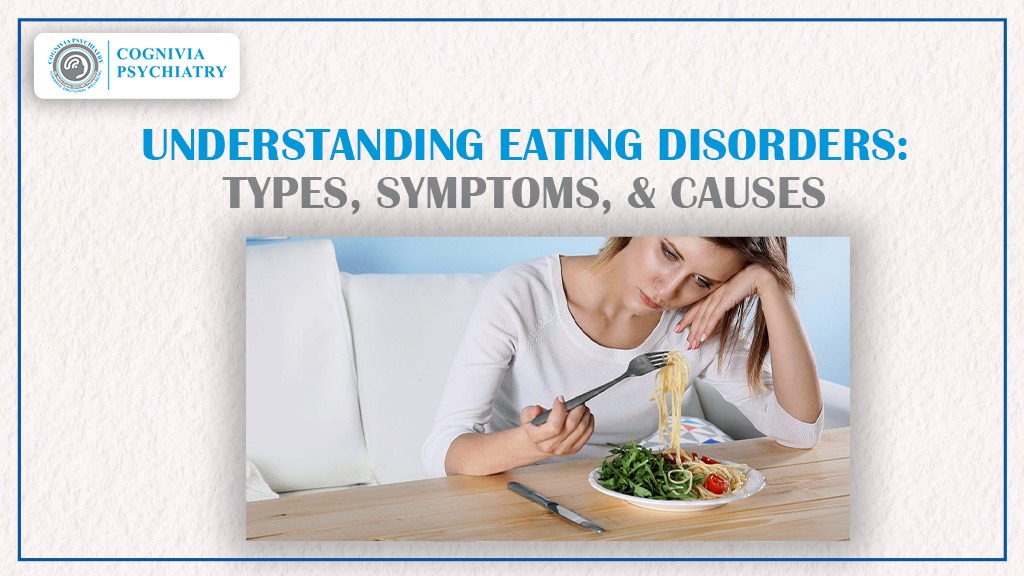
Eating disorders are a type of mental health condition that is characterized by abnormal or disordered eating habits, as well as distorted attitudes towards body weight, shape, and food. These disorders can affect anyone, regardless of age, gender, or ethnicity, and can have serious physical and psychological consequences. Eating disorders are a group of mental health conditions that are characterized by disturbed eating habits and preoccupation with weight, body shape, and food. These conditions can be life-threatening if left untreated and can have serious physical and psychological consequences.
Types of Eating Disorders:
There are three main types of eating disorders, which include:
- Anorexia Nervosa:
Anorexia nervosa is a severe eating disorder that is characterized by a distorted body image and an intense fear of gaining weight. Individuals with anorexia nervosa restrict their food intake to the point where they become dangerously underweight. This condition is more common in females than males, and it usually begins during adolescence or early adulthood.
Symptoms of anorexia nervosa include:
• Extreme weight loss
• Intense fear of gaining weight
• Distorted body image
• Obsessive thoughts about food and weight
• Refusal to eat certain foods or food groups
• Excessive exercise
• Dry skin and hair
• Brittle nails
• Low blood pressure
• Irregular menstrual periods in females
• Decreased libido in males
- Bulimia Nervosa:
Bulimia nervosa is an eating disorder that is characterized by episodes of binge eating followed by purging. Individuals with bulimia nervosa may consume large amounts of food in a short period of time and then try to get rid of the calories by vomiting, using laxatives, or engaging in excessive exercise. This condition is more common in females than males, and it usually begins during adolescence or early adulthood.
Symptoms of bulimia nervosa include:
• Binge eating
• Purging behaviors (vomiting, laxative use, excessive exercise)
• Obsessive thoughts about food and weight
• Feeling out of control during binge eating episodes
• Depression or anxiety
• Sore throat or swollen glands
• Dental problems (due to stomach acid from vomiting)
• Irregular menstrual periods in females
• Decreased libido in males
- Binge Eating Disorder:
Binge eating disorder is an eating disorder that is characterized by episodes of binge eating without purging. Individuals with binge eating disorder may consume large amounts of food in a short period of time and feel a lack of control over their eating behaviors. This condition is more common in females than males, and it usually begins during adolescence or early adulthood.
Symptoms of binge eating disorder include:
• Binge eating
• Feeling out of control during binge eating episodes
• Eating when not hungry
• Eating alone due to embarrassment
• Depression or anxiety
• Feeling guilty or ashamed after binge eating episodes
• High blood pressure
• High cholesterol levels
Causes of Eating Disorders:
The exact cause of eating disorders is not known, but there are several factors that may contribute to the development of these conditions. These factors include:
- Genetics:
Studies have shown that there may be a genetic component to eating disorders. Individuals with a family history of eating disorders are more likely to develop these conditions themselves.
- Psychological Factors:
Psychological factors, such as low self-esteem, perfectionism, and a history of trauma or abuse, may also contribute to the development of eating disorders.
- Environmental Factors:
Environmental factors, such as societal pressure to be thin, cultural attitudes towards body shape and size, and exposure to images of thin models in the media, may also contribute to the development of eating disorders.
- Neurotransmitters:
Neurotransmitters, such as serotonin, have been implicated in the development of eating disorders. Serotonin is involved in the regulation of mood, appetite, and other physiological processes, and disruptions in serotonin levels may contribute to the development of eating disorders.
- Dieting:
Dieting can also be a risk factor for the development of eating disorders. Restrictive diets can lead to a preoccupation with food and weight, which can ultimately lead to the development of disordered eating behaviours.
Treatment for Eating Disorders:
Treatment for eating disorders typically involves a combination of psychotherapy, medication, and nutritional counselling. The specific treatment approach will depend on the type and severity of the eating disorder.
- Psychotherapy:
Psychotherapy, such as cognitive-behavioral therapy (CBT), is often used to treat eating disorders. CBT can help individuals identify and change negative thoughts and behaviors related to food and body image.
- Medication:
Medication, such as antidepressants, may also be used to treat eating disorders, particularly when there is an underlying mood or anxiety disorder.
- Nutritional Counseling:
Nutritional counselling can help individuals develop a healthy relationship with food and learn how to properly nourish their bodies.
- Hospitalization:
In severe cases, hospitalization may be necessary to stabilize an individual’s physical health and provide round-the-clock care.
Conclusion:
Eating disorders are complex mental health conditions that can have serious physical and psychological consequences if left untreated. It is important to seek professional help if you or someone you know is struggling with an eating disorder. Treatment is available and recovery is possible with the right support and resources. Remember, eating disorders are not a choice, but recovery is.




